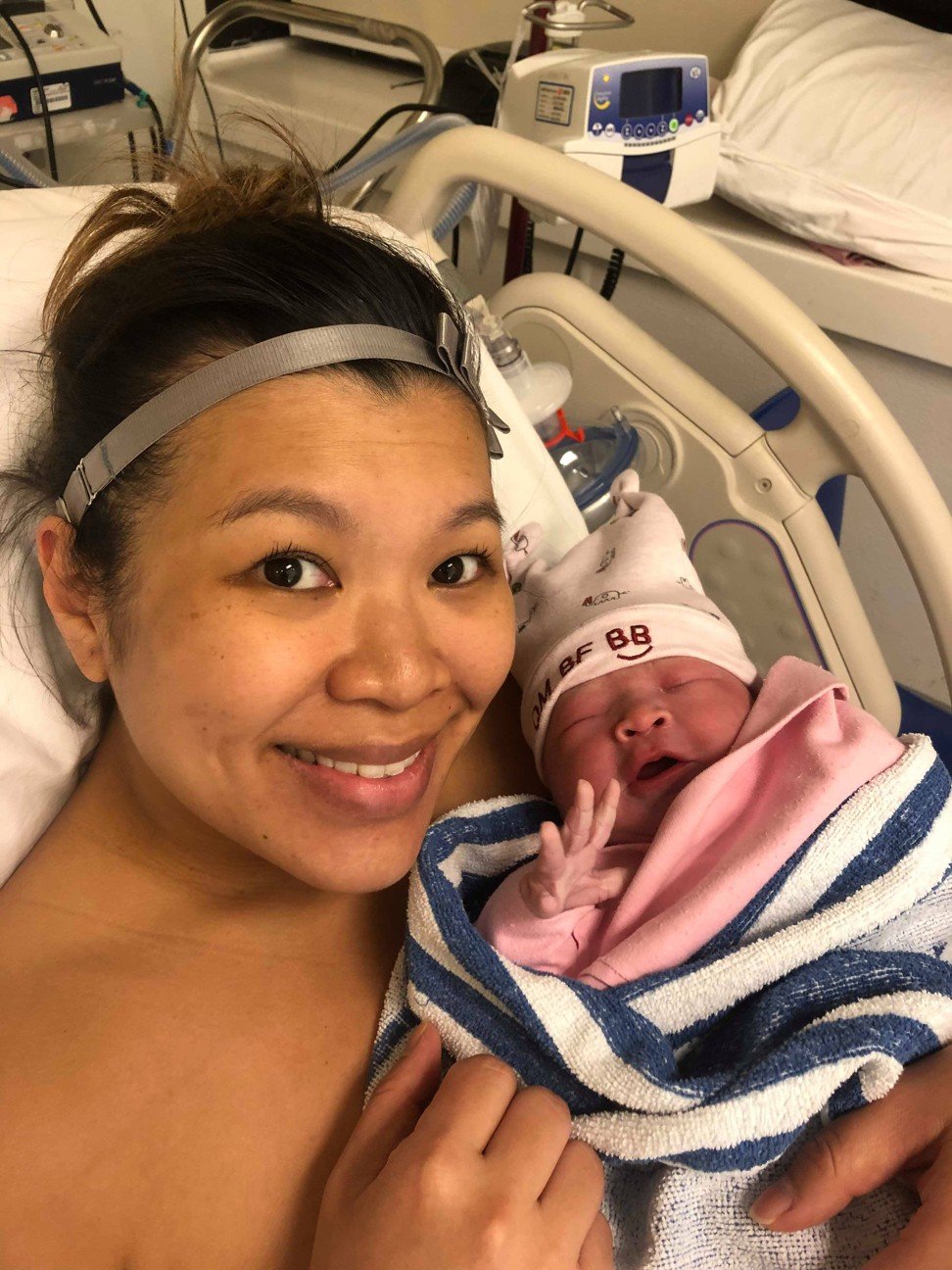
Giving birth amid coronavirus emergency – no husband in delivery room, no visitors allowed, so how did mother cope? With music, yoga, and meditation
- Nine days past her due date, one Hong Kong mum had no choice but to have her baby induced in hospital, and this time without her husband at her side
- Doing yoga and meditating ahead of the birth, and listening to music during it, helped her stay calm – things that research shows help manage pain and stress

Dee Cheung did everything she could to prepare her mind and body for the birth of her second child last month. The 34-year-old Chinese-Canadian – who moved to Hong Kong in 2006 – practises yoga and meditation, is a fan of calming essential oils and mantra music, and keeps physically fit, regularly engaging in her passion of stand-up paddleboarding.
As founder of Float On Hong Kong – the city’s first flotation therapy centre – she is an advocate of a holistic approach to health and happiness.
But, as often happens in life, a situation arose that was out of her control.
On January 26, Cheung checked in at Hong Kong’s Queen Mary Hospital in Pok Fu Lam to be induced – she was nine days past her due date – only to be told emergency measures had just been put in place that very day against the coronavirus, forcing the closure of schools, the cancellation of events and, since she gave birth, a strike by public hospital workers.

Cheung says the measures implemented at that time meant no visiting hours at all in the labour or postnatal wards, and no birth partners in the delivery ward. This time her husband, Ciaran Hussey – who had been present at the 2016 birth of the couple’s first child, Mya, also at Queen Mary Hospital – would have to wait in the corridor.
“It took me a while to accept that I couldn’t have my husband present for the birth,” says Cheung. “I had a good cry and we did joke that he wouldn’t have done much in the delivery room anyway, but it would have been special for him to witness this birth because it was so raw and different to our first delivery. But we didn’t have time to delay. We were already past 41 weeks.”
According to the US-based Mayo Clinic, pregnancy is considered “full-term” at 40 weeks and, while most babies are born around the estimated due date, a pregnancy that goes longer than 42 weeks is considered overdue. If the mother and baby are well, being up to one week “late” is not linked with any risks, but after that, the likelihood of the mother or child developing health problems increases.
“In the Hong Kong public system, at 40 weeks they give you 10 days more to go naturally and if you don’t, then they induce you,” says Cheung. “I’m well aware of this – for my first birth I was in labour for more than three days.”
This time, Cheung was induced to bring on contractions and active labour.

The following day – after just 45 minutes – Isla Flo Hussey, weighing 4kg (8lb 8oz), was born.
“I’m so thankful for the incredible staff who were kind and compassionate during my time in hospital,” says Cheung. “I had the best doctor who coached me through this birth with no drugs. When I found myself scared, I reminded myself to trust that it would all be OK and to breathe whatever way the doctor told me.”
Cheung attributes yoga and meditation to helping her stay calm and trust her instincts during her experience.
Many scientific studies support the claim that practising yoga can reduce the symptoms of stress. One of the more recent studies, conducted by the Boston University School of Medicine in the US and published in November’s Journal of Psychiatric Practice, found yoga can be a helpful complementary treatment for clinical depression or major depressive disorder.
Cheung says listening to a playlist during the birth also played a role in keeping her calm, and research shows that listening to music during birth can help women better manage pain and stress.
“I had my own music playlist on during Isla’s birth,” says Cheung, adding she was tuned in to the chilled sounds of US spiritual group Beautiful Chorus. “It really kept me focused when I had to push and breathe in between.”

Expectant mums who are expected to give birth soon in Hong Kong should brace themselves to mentally and emotionally adjust to the new ongoing situation, she says. She adds it is vital to check with hospitals to see what new policies have been implemented during the outbreak, as it varies from hospital to hospital and different policies are in place for the private and public systems.
“I hope by sharing this it can help expectant mums feel less upset or scared about these new developments, especially the one of no birth partners in the delivery ward, if that’s still the case. I want to make sure expectant mums, especially first-time mums, don’t feel upset or scared about these new developments.
“Giving birth at a time like this when people are anxious, and hospital staff are wearing masks, can be daunting, but it’s vital to reach deep and stay calm.
“If anyone wants to reach out to me to talk more, or maybe just needs some support, I’m happy to talk. I also highly recommend the supportive team at Annerley OT&P, a group of midwives who put mums first, and an experienced obstetrics team working with them.”